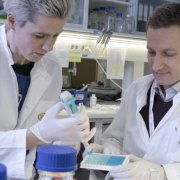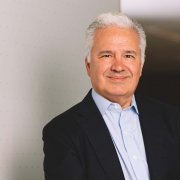New centre for precision immunotherapy
Immunotherapy has the potential to cure advanced cancer – now a new Centre of Excellence will look at how to tailor precise and effective treatments for patients.
Nine new Centers of Excellence have been awarded NOK 1,4 billion by the Norwegian Research Council. One of the centers will focus on precision immunotherapy and has received NOK 155 million.
Develop effective treatments
The centre is called Precision Immunotherapy Alliance (PRIMA) and is led by Johanna Olweus, M.D., Ph.D. Professor and Head of Department of Cancer Immunology, Oslo University Hospital and Karl-Johan Malmberg, M.D., Ph.D. Professor, University of Oslo. The alliance consists of in total seven research group leaders from Oslo University Hospital and the University of Oslo.
“Our center aims to identify targets and immune receptors that enable precise and effective treatment of cancer with manageable side effects, but the goal is that the therapies that will be developed can be used for many patients. The tools and technologies that we will develop based on our in-house concepts provide unique opportunities for this, in particular because of the complementary expertise of the various center partners,” commented Olweus.
A great acknowledgment
Malmberg and Olweus said the designation of the Centre of Excellence represents a great acknowledgement of the cancer research milieu in Oslo, and that it puts them in the position to make an even greater impact internationally.
“The timing to form a Centre of Excellence in precision immunotherapy is perfect. The possibilities to make breakthroughs in cancer immunotherapy research have never been bigger. The research group leaders that have joined forces in Precision Immunotherapy Alliance possess complementary expertise needed to address outstanding challenges in the field,” commented Malmberg.
Access to new therapies
Malmberg and Olweus stressed that the success of the centre relies upon collaboration with different institutions. They hope Oslo University Hospital and the University of Oslo will support them and that they can have a good dialogue with medical authorities, such as the Norwegian Medicines Agency.
“The aim is that Norwegian patients will get access to new therapies in clinical trials very early, rather than having to wait for new therapies to come from abroad. Innovation can also spur a generation of new start-ups and collaboration with existing industry, resulting in more clinical trials being attracted to Norway. We also believe that this will allow for us to attract talented researchers and clinicians who want to work with cancer immunotherapy, from Norway and abroad,” said Olweus.












